Everett has started work on a major long-range planning process for the city-owned transit system. Population and employment are projected to grow substantially in the coming decades, which begs investments in transit. By 2035, the number of residents in Everett is projected to grow by 60% to more than 165,000 (up from 104,900 residents in 2014). The City plans to focus much of that growth in Everett’s burgeoning city center. More than a quarter of the 60,000 new residents will live in Metro Everett, the city center area. At least 25,000 new homes will be built, and jobs growth is also expected to leap by more than 46,000. The first phase of the long-range planning process for Everett Transit is centered on high-level community vision and values.
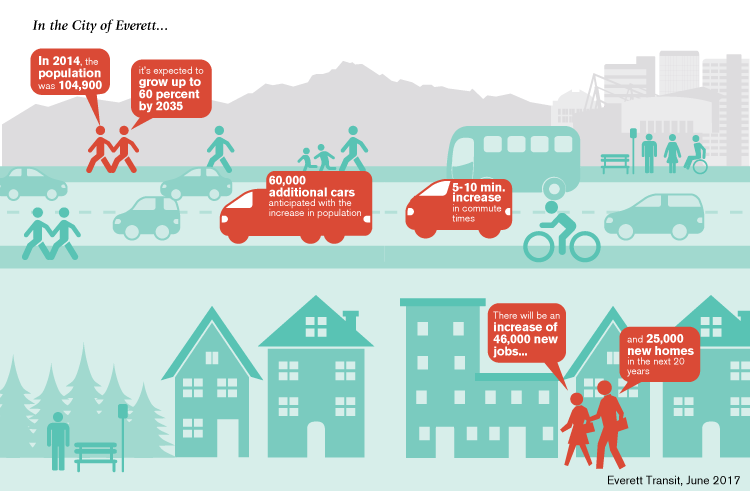
Everett Transit is trying to identify what types of priorities that area residents, employees, and visitors have in remaking the transit system. The agency is focusing on six key transit service objectives:
- Coverage (the areas where bus is provided);
- Frequency (how often buses provide service);
- Comfort and safety (how the transit experience feels);
- Span of service (the hours that bus service is provided);
- Low cost (how much fares should be);
- Service type (local, commuter, and high capacity).
These objectives inevitably come down to values and corresponding costs. Reducing fares or keeping them low, for instance, can induce ridership and make transit more accessible, but it could come at the cost of additional service. Graduating fares based upon income and station in life can spread transit dollars more equitably while still inducing ridership and investing transit in other ways. Expanding coverage can provide greater accessibility to more places, but it can come at the cost of travel times, frequency, and span of service. Ultimately, the public has the opportunity to consider how the levers should be pulled in each direction for differing objectives. Those objectives will necessarily help determine how Everett Transit deploys service in the future.
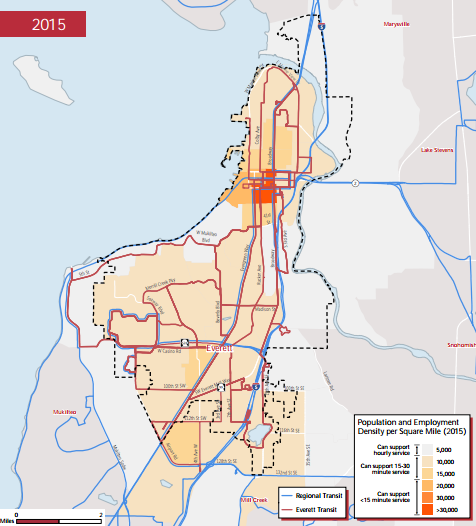
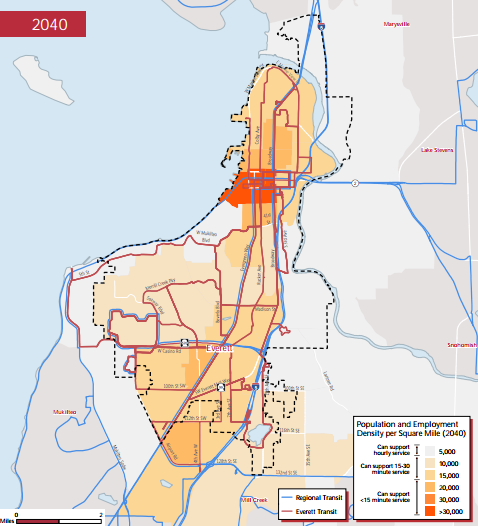
Currently, Everett Transit runs mostly a local bus network. Sound Transit, Community Transit, Kitsap Transit, Amtrak, and Island Transit step in to provide more regional, commuter, and high capacity transit service. The initial long-range plan survey, however, considers how Everett Transit might diversify its bus network. Specifically, the survey identifies three service types:
Local. Local service provides all-day connections with stops that are close to a rider’s starting point and destination, limiting the distance that riders must walk while providing a consistent level of service throughout the day.
Commute. Commute service emphasizes peak-period travel, with limited stops that require longer distance to access, but with faster travel times and more frequent service during the traditional commute hours.
High-capacity. High-capacity service has limited stops, but more frequent service all day to allow for more spontaneous travel. This type of service focuses primarily on higher density areas of the city to provide more frequent and faster service between high concentrations of housing and employment centers.
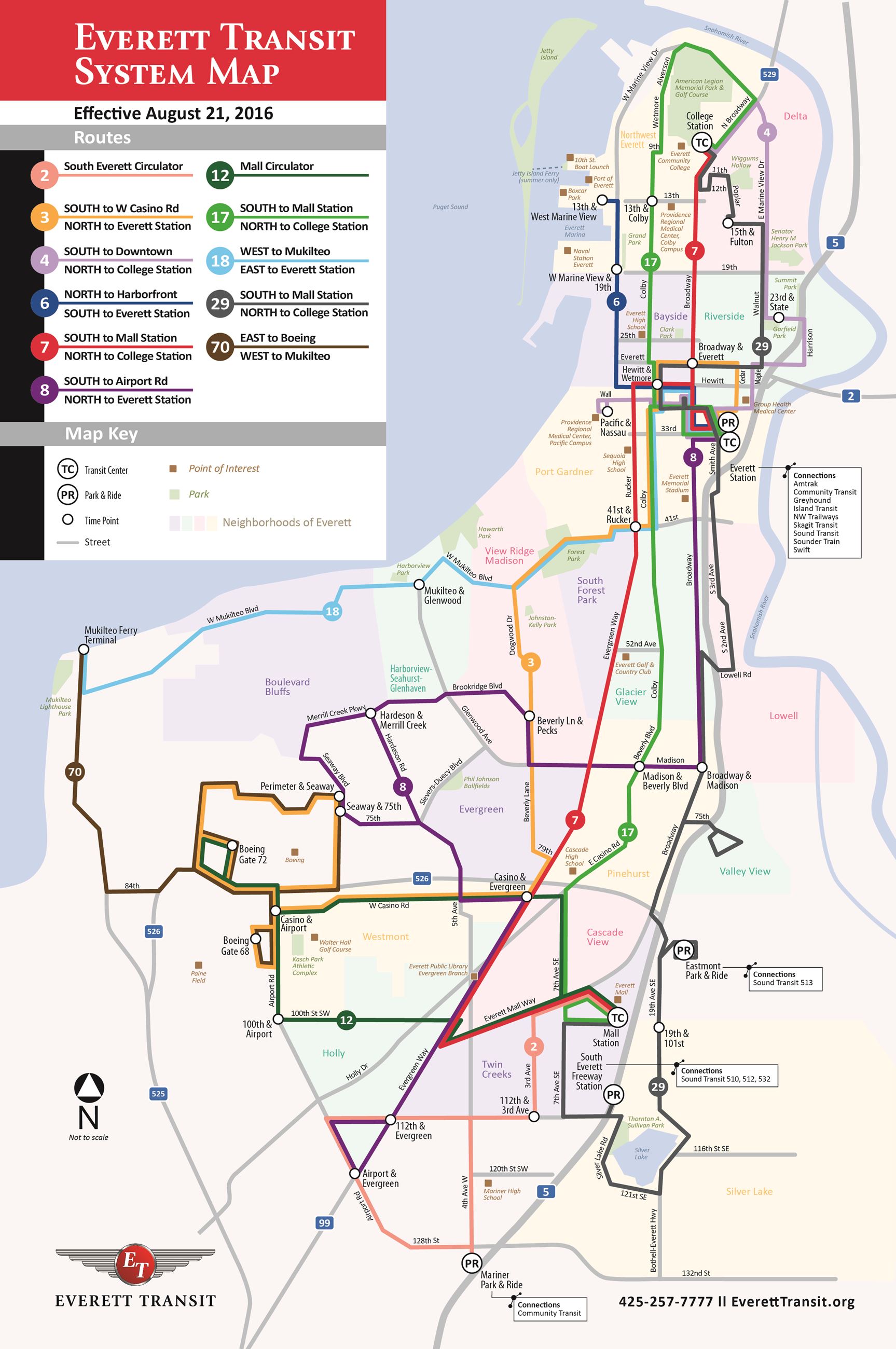
The initial survey also highlights specific areas that the long-range planning effort will evaluate, which include:
- Alternative mobility options (i.e., looking at possible partnerships with emerging mobility technologies, such as bikeshare, carshare, and taxis);
- Autonomous technology (i.e., how driverless and automatic vehicle technology may be used in transit);
- Battery technology (i.e., considering how battery buses may be adopted into the fleet in the future); and
- Access-to-transit (i.e., considering last-mile strategies and investing in pedestrian and bicycle infrastructure).
The long-range planning process will continue through Spring 2018. Once the initial visioning and values process wraps up, Everett Transit will analyze the information before coming back to the public to get feedback on service options in the fall. A draft plan will then be released in the New Year for public consideration with a final long-range plan to be published in March.
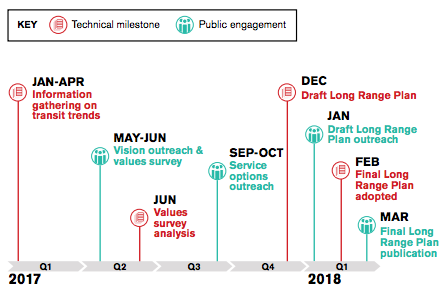
Everett Transit is inviting the public to learn more about the long-range planning process and provide early feedback that will be used to inform the overall process. An online open house is available through June 22nd. The agency will also hold a visioning workshop tonight and two open houses this month.
Visioning Workshop (Everett Station)
Thursday, June 8 (6pm to 8pm)
3201 Smith Ave, Everett (Weyerhaeuser Room, 4th Floor)
Drop-In Session (Everett Mall)
Saturday, June 10 (4pm to 6pm)
1402 SE Everett Mall Way, Everett (Near Massage Envy)
Drop-In Session (Everett Community College)
Monday, June 12 (12pm to 2pm)
2000 Tower Street, Everett (Gray Wolf Hall, Lobby)
Stephen is a professional urban planner in Puget Sound with a passion for sustainable, livable, and diverse cities. He is especially interested in how policies, regulations, and programs can promote positive outcomes for communities. With stints in great cities like Bellingham and Cork, Stephen currently lives in Seattle. He primarily covers land use and transportation issues and has been with The Urbanist since 2014.



